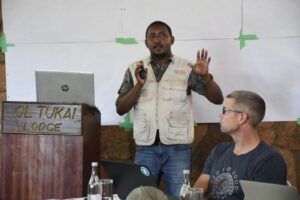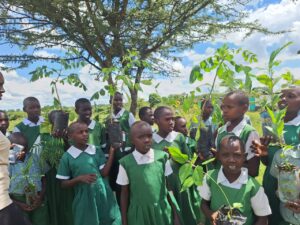In April, Mara Elephant Project’s intelligence team got some solid leads out of northern Serengeti indicating that there is still a fair amount of elephant poaching going on for ivory. This continued threat to elephants shows that we need to continue to keep up the intelligence work across the border in partnership with the Tanzania National Parks Authority (TANAPA).
MEP Monthly Report April 2019
In April, MEP collared elephant Ivy and her herd were crop raiding toward the end of in Kirindon and were pushed by MEP rangers to the safety of a nearby conservancy. This was one of the 10 total human-elephant conflict incidents MEP rangers responded to in April. All were mitigated using firecrackers and the ranger’s vehicles. Conflict across the Mara River continued to increase in April, and in response, MEP moved the Transmara team closer to the crossing points from the Nyakweri Forest were they were previously based.
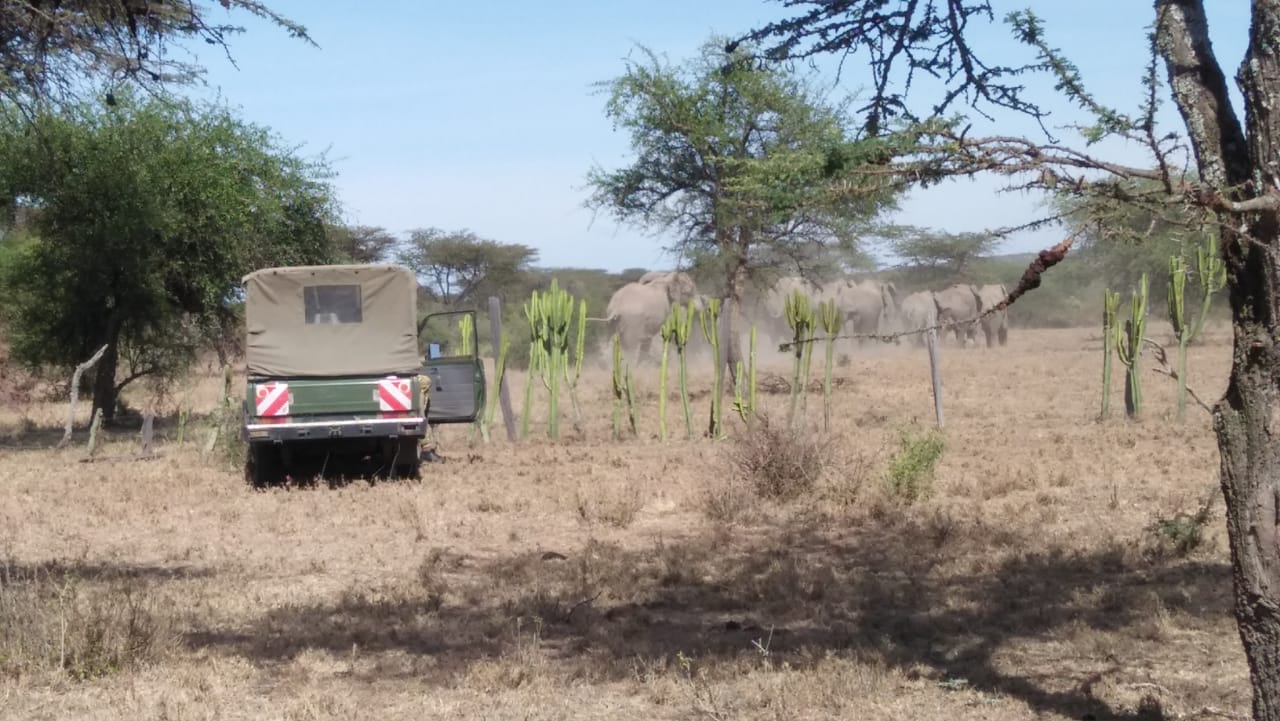
MEP rangers responding to conflict on April 16. They were able to move elephants into safety using their vehicle and firecrackers.
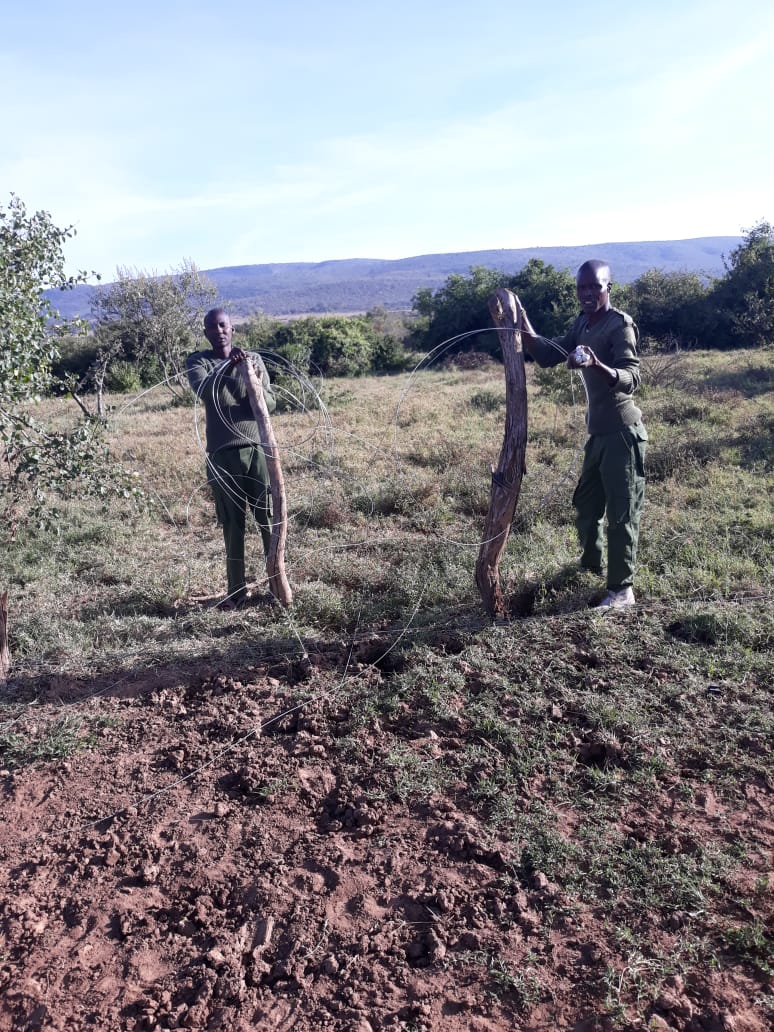
MEP rangers helping to repair a damaged fence from the HEC incident on April 16.
In April, MEP rangers along with partners Kenya Wildlife Service arrested two suspects and seized a total of 21 kg of ivory. MEP ranger units also removed a total of 11 snares and one drop spear and confiscated 120 pieces of illegal posts, one power saw and destroyed three poacher’s camps.
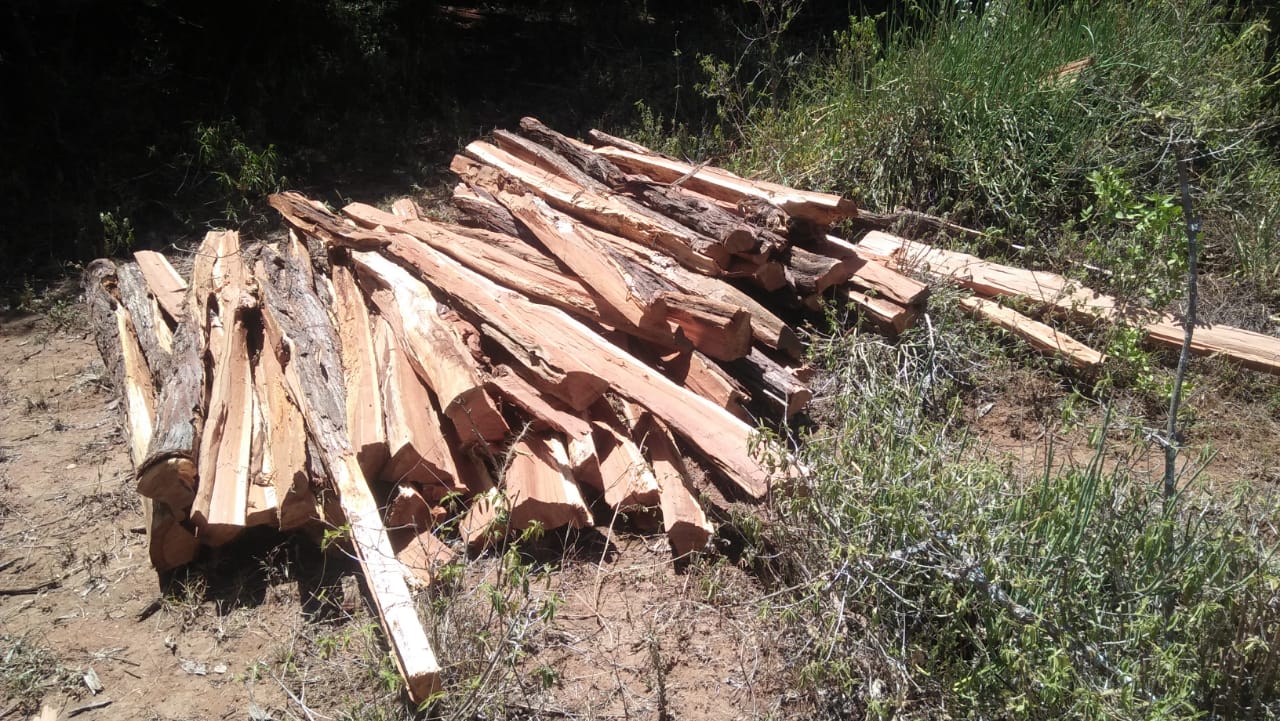
Sixty posts of illegally logged wood recovered by MEP and KWS rangers on April 9.
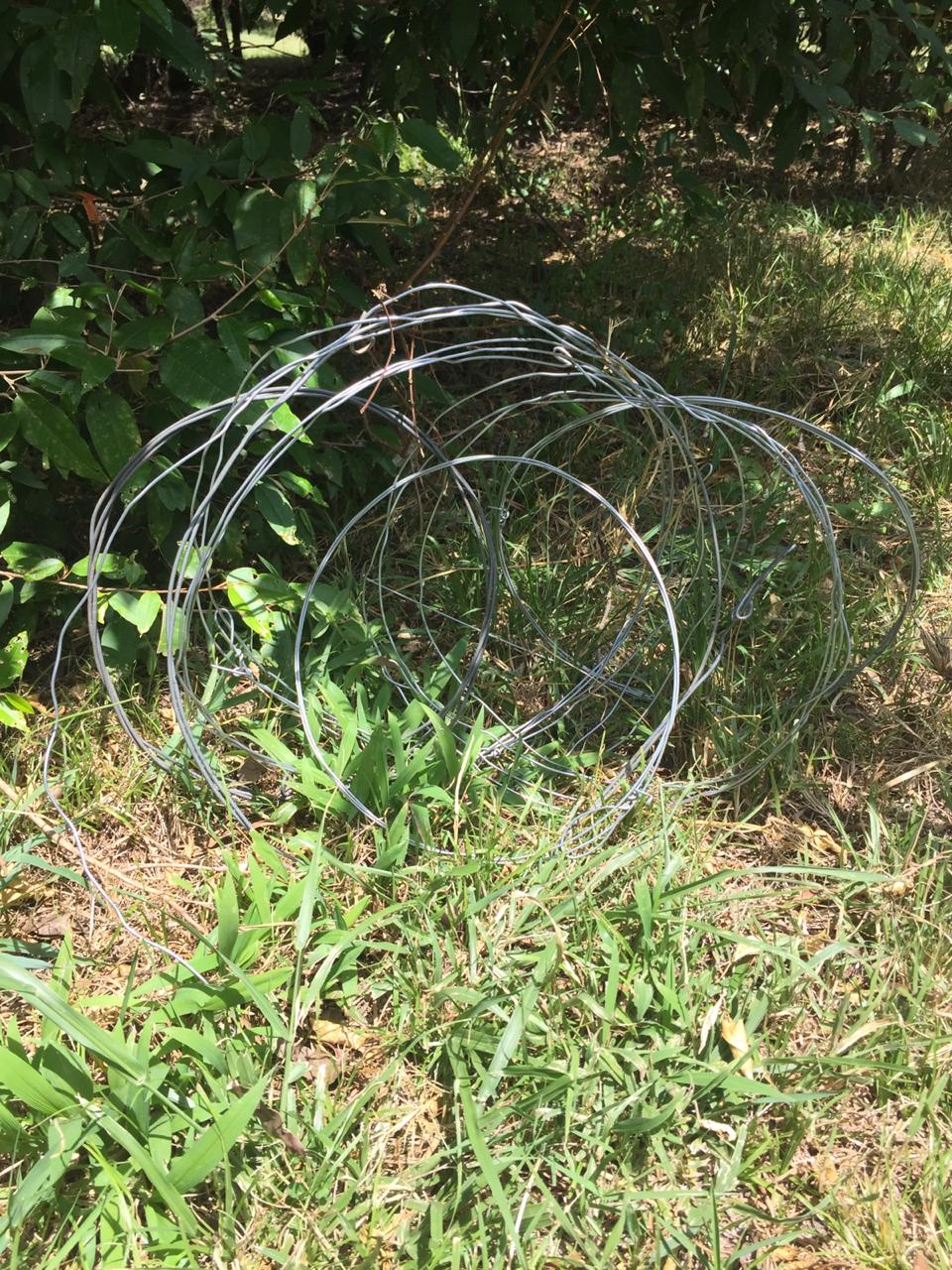
Snares recovered on April 3.
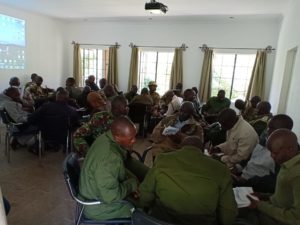 MEP hosted a dedicated Monitoring of Illegally Killed Elephants (MIKE) training for all of the conservancies, Narok County Government, MEP and at MEP HQ in April (pictured left). The MIKE program is a CITES program which strives to gather detailed data on elephant mortalities. Each quarter stakeholders collecting carcass data gather around the Mara to harmonize the data which means the data is reviewed together to ensure accuracy. The training is grouped into three two-day sessions that started on April 8 with the purpose to disseminate and promote MIKE ranger-based monitoring protocols and guidelines as a basis for strengthening MIKE site data collection and management. Participants were taken through MIKE reporting obligations to CITES that included MIKE data flow from ranger posts to MIKE CCU and ultimately to the production of updated MIKE analysis reports for CITES. Emphasis was put on reporting procedures and quality data collection. They were also trained on use of the GPS units for recording location data, cameras, establishing the cause of death, deducing the reason for death, elephant aging, carcass aging, sexing and recording evidence at the scene. Overall, the MEP training had 45 participants and at the end of the three sessions 92 people were trained in MIKE data collection procedures and harmonization. Mara Elephant Project would like to thank Kenya Wildlife Service for partnering to make this training happen and Ol Kinyei Conservancy, Olare Motorogi Conservancy and Mara North Conservancy contributing financially toward this vital training.
MEP hosted a dedicated Monitoring of Illegally Killed Elephants (MIKE) training for all of the conservancies, Narok County Government, MEP and at MEP HQ in April (pictured left). The MIKE program is a CITES program which strives to gather detailed data on elephant mortalities. Each quarter stakeholders collecting carcass data gather around the Mara to harmonize the data which means the data is reviewed together to ensure accuracy. The training is grouped into three two-day sessions that started on April 8 with the purpose to disseminate and promote MIKE ranger-based monitoring protocols and guidelines as a basis for strengthening MIKE site data collection and management. Participants were taken through MIKE reporting obligations to CITES that included MIKE data flow from ranger posts to MIKE CCU and ultimately to the production of updated MIKE analysis reports for CITES. Emphasis was put on reporting procedures and quality data collection. They were also trained on use of the GPS units for recording location data, cameras, establishing the cause of death, deducing the reason for death, elephant aging, carcass aging, sexing and recording evidence at the scene. Overall, the MEP training had 45 participants and at the end of the three sessions 92 people were trained in MIKE data collection procedures and harmonization. Mara Elephant Project would like to thank Kenya Wildlife Service for partnering to make this training happen and Ol Kinyei Conservancy, Olare Motorogi Conservancy and Mara North Conservancy contributing financially toward this vital training.

Using an old elephant carcass that had died of natural causes, KWS taught trainees in the field how to properly collect data at a MIKE site.
In April, MEP Director of Research and Conservation Dr. Jake Wall focused on setting up and running MEP’s own EarthRanger, a platform developed by Vulcan Inc. based in Seattle that extends the real-time monitoring system developed with Save The Elephants (STE) during his PhD. EarthRanger integrates data-streams from a wide variety of sources that is then stored and accessed securely in a cloud database. EarthRanger has a web-app to help us visualize the data feeds in real-time and also to collect new information about ‘events’ as they occur. Switching to EarthRanger as our primary data collection and storage tool will help MEP in the longer-term in the goal of protecting elephants and their environment and will promote useful research, collaborations with other organizations and data-driven conservation. In April, MEP also launched the Njiatracking app with all of our ranger vehicles. Njia is meant to be a low-cost solution for collecting tracking data on all of our vehicles and can periodically synchronize data to a cloud-server. Njia was also developed to help MEP collect relevant spatial data layers (e.g., roads, fences etc.). The next step will be to link the data feed from Njia with EarthRanger to receive the information in near real-time.
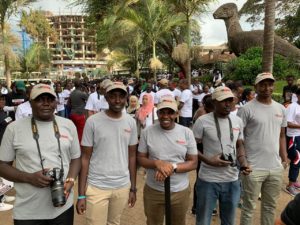 On April 13, over 4,000 people participated in the Global March for Elephants, Rhinos, Lions and Other Endangered Species in Nairobi, Kenya. Mara Elephant Project not only participated; we were one of the key sponsors for the event. MEP CEO Marc Goss along with MEP rangers Moses Lekekwar and JohnSakaja, Tracking Manager Wilson Sairowua, Administrator Elvis Saayoi, Finance Officer Stanley Misoka and Trustee Moses Kamau marched to represent MEP (pictured left). Locally, the march aimed to create awareness about the importance of protecting Kenya’s wildlife by encouraging the message: No Market. No Trade. This is all pointing to the key conservation decisions being made in May at the CITES meeting in Sri Lanka. CITES is the global treaty that regulates wildlife trade and many of the key decisions that directly affect the elephant population are made at the World Wildlife Conference. Legal markets for ivory undermine MEP’s efforts of protecting elephants and with that in mind, MEP along with other conservation organizations, government and concerned citizens in Kenya call for the closing of all legal ivory markets around the world. MEP was proud to participate in the Global March alongside our partners Kenya Wildlife Service, Wildlife Direct and other conservation organizations. The crowd was energized and came up with many chants and slogans and the colorful 4,000 plus people definitely turned heads across the city center as the march proceeded the 10 km from the National Museums of Kenya to the KWS HQ. It was an amazing experience for MEP!
On April 13, over 4,000 people participated in the Global March for Elephants, Rhinos, Lions and Other Endangered Species in Nairobi, Kenya. Mara Elephant Project not only participated; we were one of the key sponsors for the event. MEP CEO Marc Goss along with MEP rangers Moses Lekekwar and JohnSakaja, Tracking Manager Wilson Sairowua, Administrator Elvis Saayoi, Finance Officer Stanley Misoka and Trustee Moses Kamau marched to represent MEP (pictured left). Locally, the march aimed to create awareness about the importance of protecting Kenya’s wildlife by encouraging the message: No Market. No Trade. This is all pointing to the key conservation decisions being made in May at the CITES meeting in Sri Lanka. CITES is the global treaty that regulates wildlife trade and many of the key decisions that directly affect the elephant population are made at the World Wildlife Conference. Legal markets for ivory undermine MEP’s efforts of protecting elephants and with that in mind, MEP along with other conservation organizations, government and concerned citizens in Kenya call for the closing of all legal ivory markets around the world. MEP was proud to participate in the Global March alongside our partners Kenya Wildlife Service, Wildlife Direct and other conservation organizations. The crowd was energized and came up with many chants and slogans and the colorful 4,000 plus people definitely turned heads across the city center as the march proceeded the 10 km from the National Museums of Kenya to the KWS HQ. It was an amazing experience for MEP!
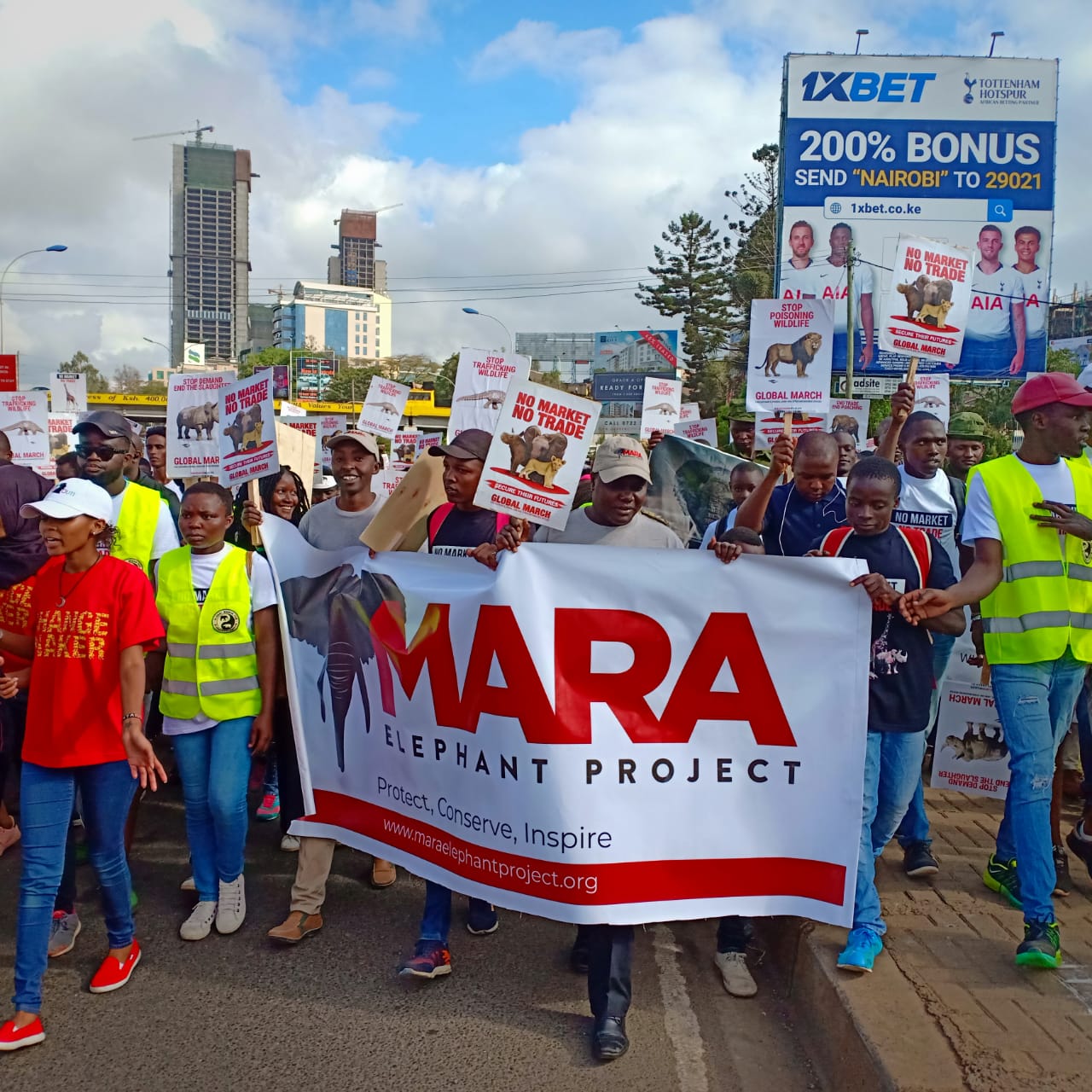 The MEP team marching alongside our partners in Nairobi for the March for Elephants.
The MEP team marching alongside our partners in Nairobi for the March for Elephants.
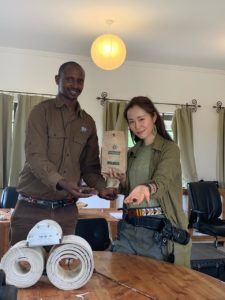
On April 22, MEP celebrated Earth Day by distributing seed balls from Seedballs Kenya with famous Chinese actress, singer and photographer Jiang Yiyan (pictured left with MEP Administrator Elvis). It was a pleasure hosting her and we thank everyone for the seed ball donations that continue to come in for MEP.
There continues to be amazing entries coming into the Greatest Maasai Mara photography competition. Thank you to everyone who entered in April and supported MEP with your entry fee. Thank you to Isabella Steinhoff, Silvia Gonzalez, Stephen Underwood, Mara Irma Cuellar, Munir Virani, Rihaz Sidi and India Bulkeley. Amazing pictures!
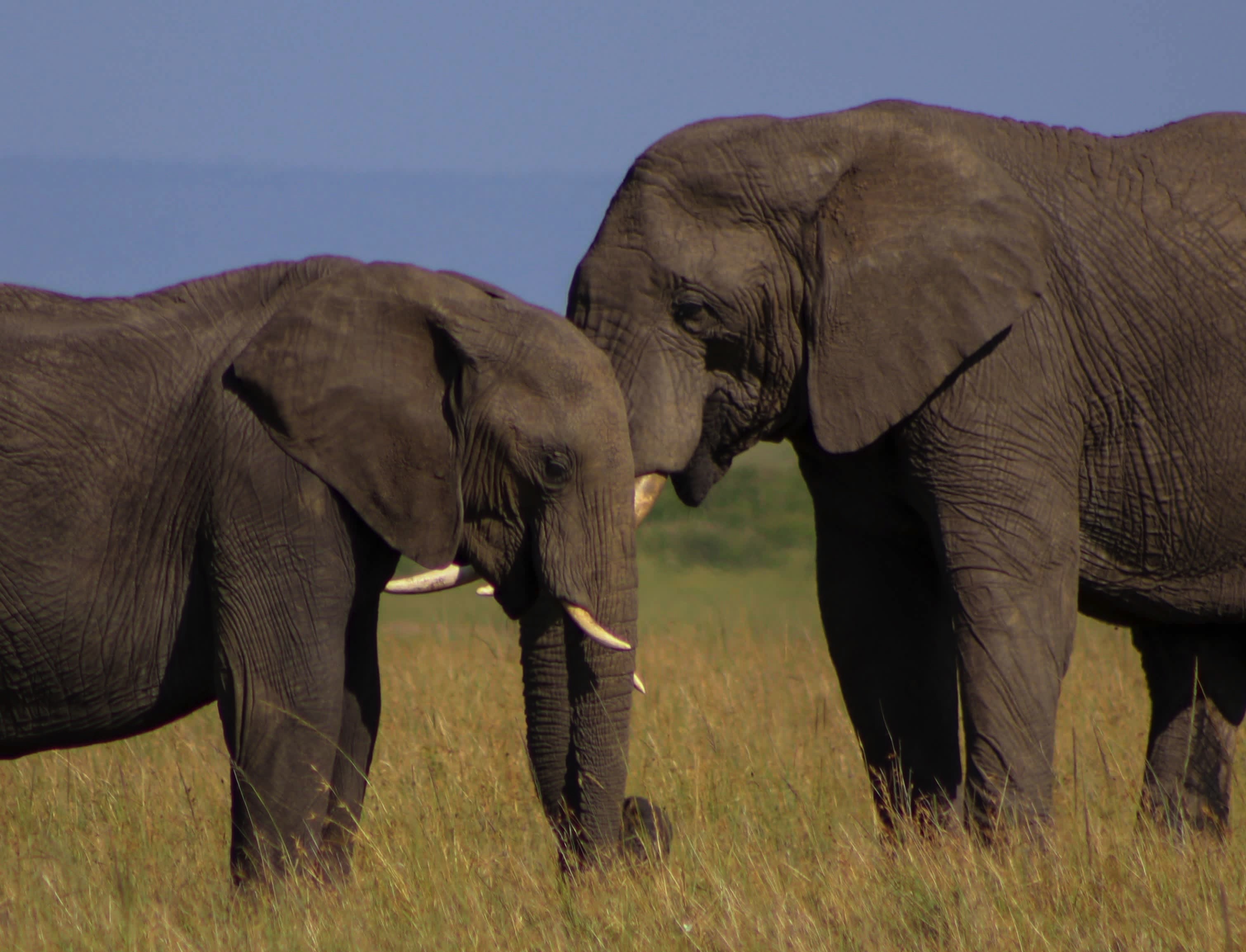
An entry entitled “holding hands” by Stephen Lesanjo.
